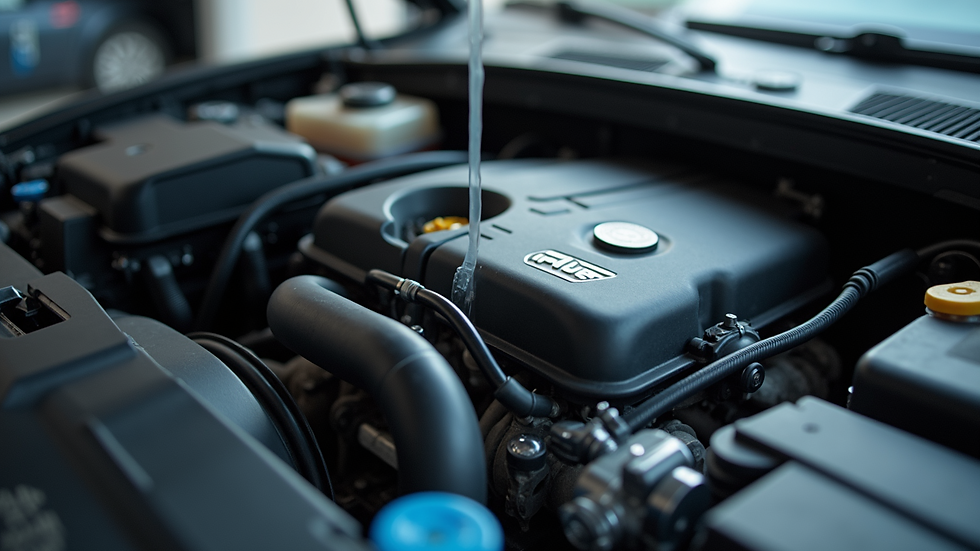Diagnose with Car Repair and Fix Your Car's Problems Effectively
- Steven Bruno

- Jul 11, 2025
- 4 min read
When it comes to owning a vehicle, car troubles are almost inevitable. Whether it's a strange noise, a dashboard warning light, or an unusual smell, diagnosing and fixing your car's problems can sometimes feel overwhelming. However, understanding your vehicle and knowing how to troubleshoot issues can save you both time and money. In this article, we will explore valuable car repair tips that will help you effectively diagnose and address common automotive issues.
Car Repair Tips: Understand Your Vehicle
Before you start diagnosing problems, it's essential to familiarize yourself with your vehicle. Each car comes with its manual, which contains critical information about its functions and maintenance recommendations.
Knowing the warning lights on your dashboard is also crucial. For instance, the check engine light may indicate a wide range of issues, from a loose gas cap to more severe engine problems. Always get familiar with what each light means and take note when they come on.

Additionally, keep a detailed log of your car's performance and any issues that arise. This log will be invaluable when discussing problems with a mechanic or if you need to troubleshoot an issue on your own.
Common Car Problems and How to Diagnose Them
After understanding your vehicle better, the next step is identifying common car problems and their symptoms. Here are some typical issues and how to diagnose them:
1. Overheating Engine
An overheating engine can cause severe damage if not addressed quickly. If your temperature gauge approaches the red zone, pull over safely and check the coolant level in your reservoir.
Symptoms:
Steam rising from under the hood
Temperature gauge in the red zone
Unusual engine noises
If you suspect your engine is overheating, it is crucial to turn off the engine immediately to prevent further damage.

2. Strange Noises
Different sounds can indicate different problems within your car. A high-pitched squeal may point to worn-out brake pads, while a grinding noise could signal a failing transmission.
Symptoms:
Squealing or grinding sounds
Knocking noises when turning
Hissing sounds when accelerating
Observe when these noises occur—under acceleration, braking, or turning—to help pinpoint the issue more accurately.
3. Warning Lights
As mentioned earlier, warning lights should not be ignored. If the check engine light comes on, you may need to use an OBD-II scanner to read the error codes. These codes can direct you to the specific issue, making troubleshooting easier.
Symptoms:
Check engine light activated
ABS or oil warning light illuminated
Battery light on your dashboard
For issues that may seem minor, like a maintenance light, don’t overlook the need for regular servicing.
How to Pay for Car Repairs When You Have No Money?
Dealing with car repairs can be financially stressful, especially if unexpected issues arise. Here are a few strategies to help you manage repair costs:
1. Set Up an Emergency Fund
Consider setting aside a small amount of money each month specifically for car repairs. Even if it's just $50, over time, you will have some savings to cover unforeseen expenses.
2. Look for Payment Plans
Some automotive repair shops offer payment plans that allow you to pay for repairs over time. This can be a lifesaver if you don't have the funds available upfront.
3. Use a Credit Card Wisely
If you have a credit card, using it responsibly can help you cover repair costs. Ensure you fully understand your credit terms to avoid unexpected interest charges.
4. Seek Community Assistance
Local charities or churches may offer assistance or advice for emergency car repairs. It doesn’t hurt to ask your community if they have suggestions or resources available.
This information can help you feel more secure when unexpected repairs arise, ensuring you're not caught off guard.
The Importance of Routine Maintenance
Routine maintenance is essential in preventing significant car problems down the road. Simple tasks, such as oil changes, tire rotations, and brake inspections, should be completed at regular intervals as recommended in your owner's manual.
Regularly checking fluid levels, changing air filters, and replacing wiper blades can significantly increase your car's longevity. Skipping these can lead to bigger issues and costlier repairs later.
Additionally, keeping your car clean—both inside and out—can prevent rust and other issues. Wash off road salt and dirt, and vacuum regularly to keep your car in excellent condition.
Seeking Professional Help When Necessary
Sometimes, diagnosing and fixing your car's problems can become overwhelming, especially for complex issues. If you've tried troubleshooting on your own but cannot identify the problem's source, it may be time to consult a professional.
Finding a reputable mechanic is crucial. Look for businesses with good reviews and check their certifications. Building a relationship with a trusted technician can help you feel confident in the repairs done on your vehicle.
If extensive repairs are necessary, consider automotive repair services that offer free estimates or consultations. This way, you can compare costs before making a decision.
By understanding your car's symptoms, prioritizing maintenance, and seeking help when needed, you can tackle automotive challenges effectively and save money over time.
Taking Charge of Your Car's Health
Taking control of your car's health means being proactive rather than reactive. Educating yourself about common problems, understanding how to diagnose issues, and remaining vigilant about maintenance can elevate your driving experience.
Arming yourself with knowledge can empower you to feel more in control when it comes to car repairs. Whether with minor self-diagnosis skills or seeking expert help, staying informed ensures your vehicle remains reliable.
With the tips outlined in this article, you will be better equipped to handle your automotive responsibilities confidently and efficiently.









